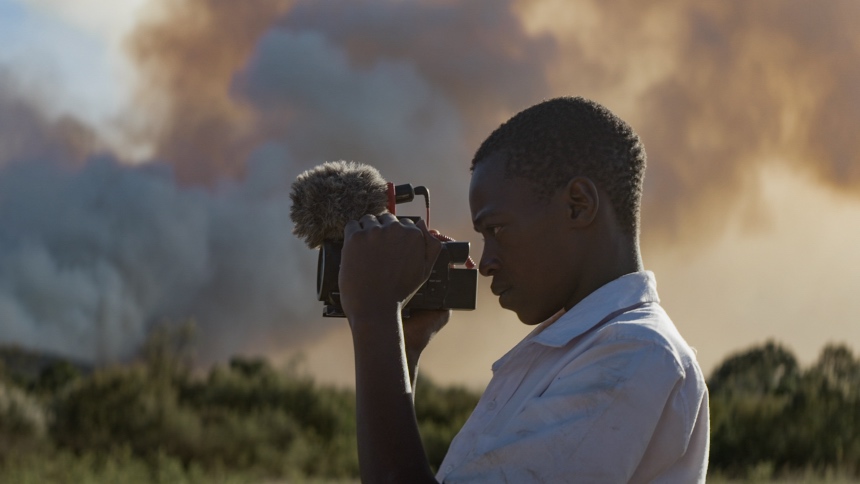Tribeca 2024 Review: SEARCHING FOR AMANI Finds Itself in a Turf War Between Kenyan Farmers and Pastoralists
Questionable directorial influences undermine a nonfiction feature, directed by Nicole Gormley and Debra Aroko.

In 2019, Stephen Ali Apetet, a tour guide at Kenya's Laikipia Nature Conservancy, was gunned down while on duty.
Authorities did not thoroughly investigate the case or bring the assailants to justice. What happened to him on that fateful day remained largely a mystery to his grieving family. The documentary Searching for Amani, which had its world premiere at Tribeca Festival, follows Ali's teenage son Simon, an aspiring citizen journalist, as he investigates the murder.
Once featured in a 60 Minutes segment, the Laikipia Nature Conservancy is a rare pristine patch of green in a wasteland plagued by protracted drought. It's the remnant of the country's British colonial past, and has since been taken over by settlers of Italian descent. The ongoing violence revolving around the nature preserve is emblematic of a larger turf war waged between local farmers and pastoralists amid drought and dwindling resources due to climate change.
Those who've had to sift through countless documentaries on the festival circuit and elsewhere will know that managed grazing is actually good for the land, as livestock provides natural fertilizer for the greenery. But you wouldn't glean that fact from this particular film. There is an archival interview with Kuki Gallmann, who owns Laikipia Nature Conservancy and whose autobiography served as basis for the 2000 film I Dream of Africa, saying pastoralists are no longer allowed to graze there because they do not respect conditions she imposes. But the film never explicitly articulates exactly what those are.
The cultural forces surrounding the murder are obviously much larger: the pastoralists, the drought, the resource grab, the colonialism, the racism, the global warming, et al. Searching for Amani explains that fewer than 30 people own all the fertile ground in the region, but it neglects to tell us the extent of the violence, narrowing its focus to just Stephen Ali Apetet's death. In fact, Gallmann herself fell victim to gun violence in 2017, which goes unmentioned here, as well as that her assailants were promptly apprehended by the police.
Searching for Amani is beautifully photographed by Campbell Brewer, at times dreamy and out of focus, transcending the traditional vérité visuals. The editing by Tessa Malsam and Davis Coombe and score by David Naroth, Monica Sonand and David Fleming sporadically imbue the proceedings with the tenor of a thriller.
All of these dramatic flourishes, while subtly manipulative, are par for the course in documentary filmmaking. Of course, we know by now the observer effect, that the mere presence of the camera invariably alters behaviors.
What's a bit ethically hazy is how much the documentarians, Nicole Gormley and Debra Aroko, have interfered with Simon Ali's investigative journey. Simon Ali is equipped with a laptop and a Sony Handycam with a shotgun microphone, which would be unaffordable to even teenagers in the West, not to mention a household like his that owns a flat-panel TV with a cracked screen. The Handycam isn't present at all interviews, most notably when his older brother, Ken Ali, conducts one on his behalf due to safety concerns. Very little of Simon Ali's own footage makes Gormley and Aroko's final cut anyway in favor of Brewer's professional cinematography.
What Gormley and Aroko are doing here isn't unique. Just as an example, the 2022 Sundance audience-award-winning doc The Territory also gets into the same murky area of nonfiction filmmaking. You have to wonder how much of the narrative is forced upon the subjects, who may or may not have independently pursued the courses of action documented. This level of interference would normally cast a series squarely in the reality TV category, but for feature-length, it's somehow still considered documentary.
Of course, one can't deny that filmmakers who do this are well-meaning and have important things to say, but more often than not they are undermining their own messages. Although English is one of Kenya's official languages, it's clear that interviewees were more comfortable speaking in Swahili. Inexplicably, many of the interviews were conducted in English, which sounded so stilted it's as if they were reading off a script. Again, if Gormley and Aroko weren't around, would English be spoken at all?
Searching for Amani is more nuanced than The Territory in that it does try to present the pastoralists' perspective in good faith. It doesn't reduce the story's antagonists to uncivilized savages but tries to empathize with their ordeal. Still, the audience should not have to answer whether the end justifies the means.
The film enjoys its world premiere at the 2024 Tribeca Festival. It screens again on Saturday, June 15.







